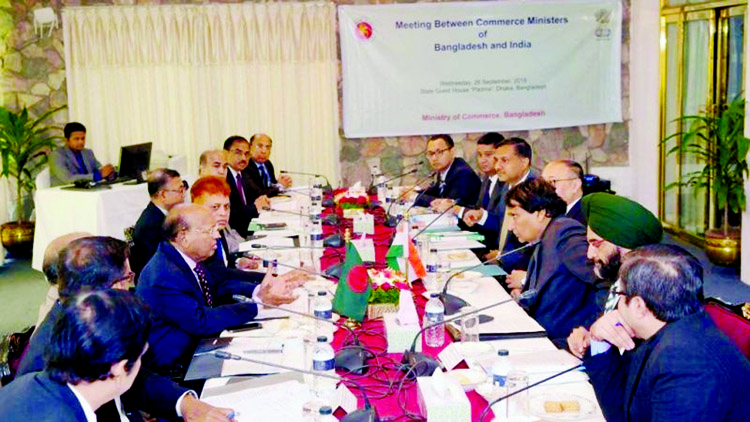
Special Correspondent :
Bangladesh and India have agreed to ink a Comprehensive Economic Partnership Agreement (CEPA) for further boosting economic ties between the two countries.
Commerce Minister Tofail Ahmed made the announcement at a press conference on Wednesday, followed by bilateral meeting with visiting Indian delegation led by his counterpart Suresh Prabhu.
The meeting was held at the sate guest house Padma in Dhaka.
Officials said, the bilateral discussion mainly focused on CEPA, construction of new border haats, Benapole-Petrapole port congestion and issues related to bilateral trade and investment promotion.
The Bangladesh delegation led by Tofail Ahmed raised various tariff and para-tariff barriers, anti-dumping duty on jute products, Hydrogen peroxide etc, while accessing Bangladeshi goods in Indian market, discrimination of tender eligibility, withdrawal of port restrictions, developing infrastructure of several LCS at Bangladesh side, ongoing anti-circumvention investigation on jute cloths and recognition of BSTI certificates for six more non-food items.
“Both the sides have agreed, in principal, to sign the CEPA for deepening economic cooperation between the two countries,” said Tofail Ahmed.
CEPA is a type of free trade deal that emphasizes wide-range of economic cooperation on top of opening respective markets.
Tofail Ahmed said Bangladesh would be graduating as developing nation from least developed country (LDC) by 2021. After becoming a developing country, the country will continue to enjoy the trade facilities (duty free market access) it has been getting as a LDC until 2027.
“We have already demanded for GSP plus facility from the European Union so that our export remain unhurt there after becoming a developing country. We moved for signing the CEPA to secure market access of local products to Indian market after 2027,” said Tofail.
The Commerce Minister further said Bangladesh and India are maintaining an excellent bilateral relations and efforts are being made to take to a new height.
“We don’t have any major dispute now as problems like enclaves and exclaves, CHT issue and maritime boundary were settled down. We’re looking at trade and commerce areas. Hopefully, we will resolve these through discussion.”
Regarding withdrawal of the anti-dumping duty on its jute and jute-made products, Tofail Ahmed said India assured Bangladesh of working on withdrawing the duty.
“Jute traders from the two countries have been asked to hold meetings to discuss and identify problems and resolve them,” he added.
India had slapped an anti-dumping duty ranging from $19 to $352 per ton on jute yarn/twine, hessian fabric and jute sacking bags brought from Bangladesh and it led to a drastic fall of jute and jute goods export to India.
“We have also invited Indian investment in Bangladesh’s Export Processing Zones,” said Tofail Ahmed.
Indian Commerce minister Suresh Prabhu said that Delhi has proposed for signing the CEPA in order to forge closer economic ties between the two neighbours.
“We’re keen to sign the deal without compromising the interest of either side. Interest of both Bangladesh and Indian industries would be taken into consideration prior signing the deal. We’ll finding something so that both the sides can develop win-win satiation,” he added.
India has already signed such agreement with Japan and South Korea.
Suresh Prabhu, the visiting Indian minister, further said both the countries have already taken various steps to deepen trade and economic cooperation between them. The new initiative will create more opportunities in new economic areas such as investment, service industry, technology transfer, human capital development and many more.
Suresh Prabhu also sought Bangladesh’s support to make the WTO more effective.
“:Let us work together so that the basic principals of WTO remain intact. A joint effort from both sides can make a transparent and effective WTO. It’s necessary to promote global trade in future,” he added.
Commenting on his visit to Bangladesh, Suresh Prabhu said, “It’s a great visit and I look forward for more such visit to take the opportunity to reunite with great Bangladeshi people.”
He also hoped that the mutual relationship between India and Bangladesh would increase further in all sectors, including trade and investment.
India is the second largest trade partner for Bangladesh after China and the two-way trade between the two countries touched US$ 9.49 billion in the fiscal year 2017-18 with trade balance (US$7.7 billion) is heavily tilted towards India.

